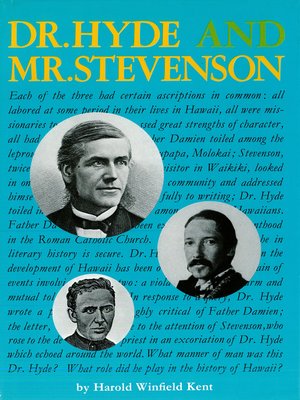Dr. Hyde and Mr. Stevenson
ebook ∣ The Life of the Rev. Dr. Charles McEwen Hyde including a discussion of the Open Letter of Robert Louis Stevenson
By Harold Winfield Kent

Sign up to save your library
With an OverDrive account, you can save your favorite libraries for at-a-glance information about availability. Find out more about OverDrive accounts.
Find this title in Libby, the library reading app by OverDrive.



Search for a digital library with this title
Title found at these libraries:
| Library Name | Distance |
|---|---|
| Loading... |
Dr. Hyde and Mr. Stevenson is a biography of the Rev. Dr. Charles McEwen Hyde, one of the most influential Americans in 19th century Hawaii.
What manner of man was this Dr. Hyde? He was a truly good example of the New England-bred, community-minded leader who throughout the course of several generations formulated the pattern we speak of as "the American way."
What role did he play in the history of Hawaii? He was very influential in setting up of the Kamehameha Schools, the Bishop Museum, and various other institutions sponsored by the philanthropist Charles Reed Bishop. He was a major force behind the establishment of the Hawaiian Historical Society, a moving spirit in the development of the Library of Hawaii, and the founder of the Social Science Association in 1882 for which he served as secretary for seventeen years.
Also included is a discussion of the open letter of Robert Louis Stevenson.
What manner of man was this Dr. Hyde? He was a truly good example of the New England-bred, community-minded leader who throughout the course of several generations formulated the pattern we speak of as "the American way."
What role did he play in the history of Hawaii? He was very influential in setting up of the Kamehameha Schools, the Bishop Museum, and various other institutions sponsored by the philanthropist Charles Reed Bishop. He was a major force behind the establishment of the Hawaiian Historical Society, a moving spirit in the development of the Library of Hawaii, and the founder of the Social Science Association in 1882 for which he served as secretary for seventeen years.
Also included is a discussion of the open letter of Robert Louis Stevenson.







